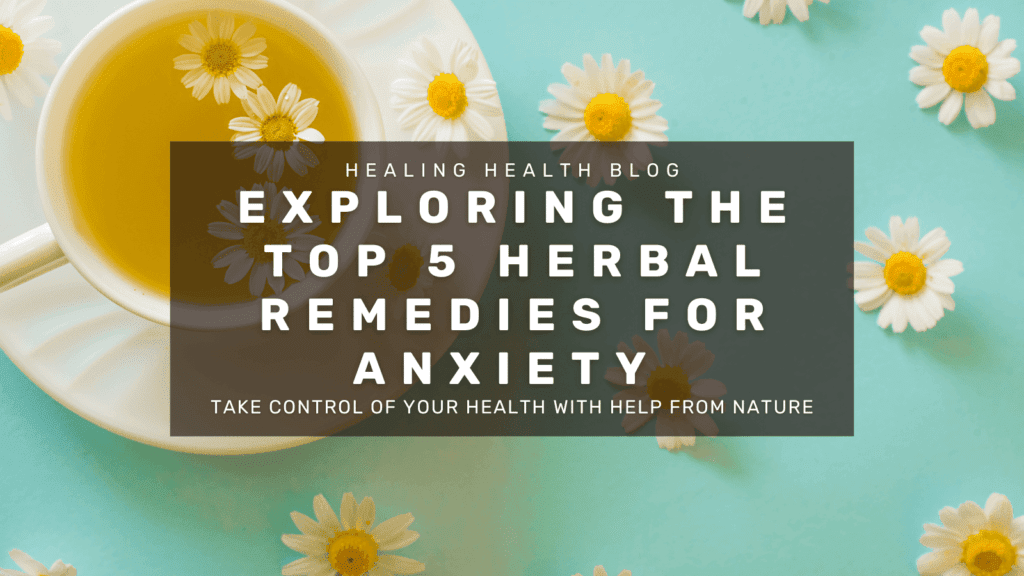
Herbal remedies for anxiety are becoming an increasingly popular choice for those seeking natural relief from the grip of this common mental health concern.
- Anxiety is a common mental health condition that affects millions of people worldwide.
- It can cause a variety of symptoms, including worry, fear, irritability, and difficulty sleeping.
- While there are many effective medications available for anxiety, some people prefer to try herbal remedies for anxiety.
- Several herbs have been shown to be effective in reducing anxiety symptoms.
- Harnessing Nature's Tranquility: Herbal Remedies for Anxiety, Featuring the Gentle Embrace of Chamomile
- Herbal Remedies for Anxiety: Relax with Lavender
- Ashwagandha: Exploring its Potent Role in Herbal Remedies for Anxiety
- Passionflower: Unveiling its Soothing Potential in Herbal Remedies for Anxiety
- Valerian root: Exploring its Significance in Herbal Remedies for Anxiety
- Taking Control of Anxiety: A Recap of Natural Remedies for Anxiety and Coping Mechanisms
This blog post may contain affiliate links inclusive of Amazon products. This means that if you make a purchase through one of these links, I may receive a small commission at no additional cost to you.
Harnessing Nature’s Tranquility: Herbal Remedies for Anxiety, Featuring the Gentle Embrace of Chamomile

Chamomile, pronounced ‘kam-o-mile’, is a flowering herb that has been used for centuries to treat a variety of health conditions.
It is thought to work by several different mechanisms, including:
- Binding to GABA receptors: GABA is an inhibitory neurotransmitter that helps to calm the brain. Chamomile contains apigenin, an antioxidant that binds to GABA receptors and increases the activity of GABA. This can help to reduce anxiety and promote relaxation.
- Reducing inflammation: Inflammation is thought to play a role in anxiety. Chamomile contains chamazulene, an anti-inflammatory compound that can help to reduce inflammation and anxiety.
- Increasing levels of serotonin: Serotonin is a neurotransmitter that is involved in mood regulation. Chamomile may help to increase levels of serotonin, which can help to improve mood and reduce anxiety.
- Promoting relaxation: Chamomile has a sedative effect that can help to promote relaxation and reduce anxiety.
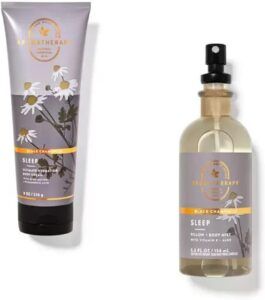
Bath and Body Works Aromatherapy Sleep Black Chamomile Pillow Mist & Body Cream Gift Set
If you are struggling with anxiety, chamomile may be a helpful natural remedy. However, it is important to talk to your doctor to make sure that chamomile is safe for you and that it will not interact with any medications you are taking.
Herbal Remedies for Anxiety: Relax with Lavender
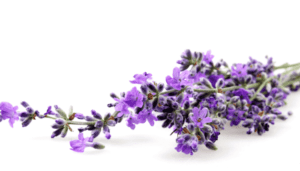
Lavender, a fragrant flowering plant, has long been used for its calming and soothing properties. Its delicate aroma has been associated with relaxation and sleep, making it a popular choice for aromatherapy and essential oils.
But did you know that lavender can also be beneficial for anxiety?
How does lavender work to reduce anxiety?
Lavender’s calming effects can be attributed to its ability to interact with the nervous system. It contains linalool, an essential oil that binds to GABA receptors, which are responsible for promoting relaxation and reducing anxiety.
Additionally, lavender has been shown to increase levels of serotonin, a neurotransmitter that plays a role in mood regulation.
How can I use lavender to reduce anxiety?
There are several ways to incorporate lavender into your daily routine to help manage anxiety. Here are a few ideas:
- Aromatherapy: Lavender essential oil can be used in a diffuser to fill your home with its calming aroma. You can also add a few drops of lavender oil to a warm bath or massage oil.
- Tea: Lavender tea is a gentle and relaxing way to enjoy the herb’s benefits. You can purchase lavender tea bags or add dried lavender flowers to hot water.
- Essential Oil Blends: Lavender can be combined with other essential oils, such as chamomile, bergamot, and Roman chamomile, to create a more personalized aromatherapy blend.
- Lavender Sachets: Sew lavender sachets filled with dried lavender flowers and place them in your bedroom or closet to promote relaxation and sleep.
- Lavender Pillows: Lavender pillows filled with dried lavender flowers can be a comforting way to unwind at the end of the day.
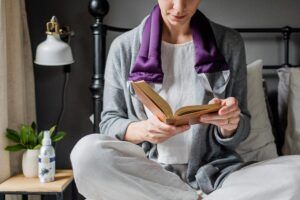
Victoria’s Lavender Luxury Microwavable Aromatherapy Lavender Neck Wrap Provides Stress and Neck Pain Relief with Organic Lavender Buds and Flax Seed, Extra Long, Excellent Gift for Relaxation.
Additional tips for using lavender for anxiety
- Start with small doses: If you are new to using lavender, start with small amounts and gradually increase the dosage as needed.
- Consult your doctor: If you are taking any medications, it is important to talk to your doctor before using lavender, as it may interact with certain medications.
- Be patient: Lavender’s effects may take some time to fully manifest. Be patient and consistent with your use of lavender to reap its benefits.
Ashwagandha: Exploring its Potent Role in Herbal Remedies for Anxiety

Ashwagandha is an adaptogenic herb that has been used in traditional Indian medicine for centuries to reduce stress, anxiety, and improve overall well-being. It is known for its ability to help the body adapt to stress and cope with difficult situations.
How does Ashwagandha work to reduce anxiety?
Ashwagandha is thought to work by several different mechanisms, including:
- Blocking cortisol: Cortisol is a stress hormone that can contribute to anxiety and other health problems. Ashwagandha has been shown to block the production of cortisol, which can help to reduce anxiety and improve mood.
- Increasing GABA levels: GABA is a neurotransmitter that helps to calm the brain. Ashwagandha has been shown to increase levels of GABA, which can further reduce anxiety.
- Reducing inflammation: Inflammation is thought to play a role in anxiety and other health problems. Ashwagandha has been shown to reduce inflammation, which can help to improve mood and reduce anxiety.
Different ways to use Ashwagandha
Ashwagandha is available in a variety of forms, including:
- Powder: Ashwagandha powder can be mixed with water, juice, or smoothies.
- Capsules: Ashwagandha capsules are a convenient way to take the herb.
- Tincture: Ashwagandha tincture is a liquid form of the herb that can be taken orally or applied topically.
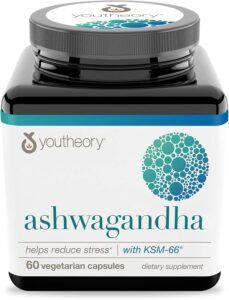
Youtheory ashwagandha Capsule, Helps Maintain Normal cortisol Level, Helps Reduce Stress, 60 Counts
Dose Recommendation
The recommended dosage of Ashwagandha varies depending on the form of the herb and the individual’s needs. However, a typical dosage is 250 to 500 milligrams of Ashwagandha extract per day.
Safety precautions
Ashwagandha is generally safe for most people, but it can interact with certain medications. It is important to talk to your doctor before taking Ashwagandha if you are taking any medications.
Passionflower: Unveiling its Soothing Potential in Herbal Remedies for Anxiety

Passionflower (Passiflora incarnata) is a flowering vine that has been used traditionally for centuries to treat anxiety and insomnia. It is thought to work by several different mechanisms, including:
- Blocking GABA-A receptor antagonists: These are chemicals that block the effects of GABA, a neurotransmitter that helps to calm the brain. Passionflower contains compounds that block these antagonists, leading to increased GABA activity and reduced anxiety.
- Increasing GABA levels: Passionflower contains compounds that increase the levels of GABA in the brain. GABA helps to promote relaxation and reduce anxiety.
- Reducing glutamate activity: Glutamate is another neurotransmitter that can contribute to anxiety. Passionflower contains compounds that reduce glutamate activity, leading to a decrease in anxiety.
How to use Passionflower for anxiety
Passionflower can be used in a variety of ways to reduce anxiety, including:
- Tea: Passionflower tea is a traditional way to use the herb. You can purchase passionflower tea bags or add dried passionflower leaves to hot water.
- Tincture: Passionflower tincture is a liquid extract of the herb. It can be taken orally or applied topically.
- Capsules: Passionflower capsules are a convenient way to take the herb.
- Aromatherapy: Passionflower essential oil can be diffused to create a calming atmosphere. You can also add a few drops of passionflower oil to a warm bath or massage oil.
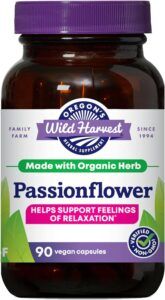
Oregon’s Wild Harvest Passion Flower Organic Vegan Capsules, 90 Count
Dose recommendations
The recommended dosage of passionflower for anxiety varies depending on the form of the herb and the individual’s needs. However, a typical dosage is 250 to 500 milligrams of passionflower extract per day.
Safety precautions
Passionflower is generally safe for most people, but it can interact with certain medications. It is important to talk to your doctor before taking passionflower if you are taking any medications.
Additional tips for using passionflower
- Start with a low dose and gradually increase it as needed.
- Take passionflower consistently for at least 2-4 weeks to see the full benefits.
- Monitor your progress and adjust the dosage as needed.
- Be patient. It may take some time to feel the full benefits of passionflower.
Passionflower is a natural and effective way to reduce anxiety and improve overall well-being. It is important to talk to your doctor before taking passionflower to ensure that it is safe for you and to discuss the best dosage for your individual needs.
Valerian root: Exploring its Significance in Herbal Remedies for Anxiety
Valerian root (Valeriana officinalis) is a perennial herb that has been used for centuries to treat anxiety and insomnia. It is commonly used as a natural alternative to prescription medications for anxiety.
How does Valerian root work to reduce anxiety?
Valerian root is thought to work by several different mechanisms, including:
- Increasing GABA levels: GABA is a neurotransmitter that helps to calm the brain. Valerian root contains compounds that increase the levels of GABA in the brain, leading to reduced anxiety and improved sleep.
- Blocking GABA-A receptor antagonists: These are chemicals that block the effects of GABA, a neurotransmitter that helps to calm the brain. Valerian root contains compounds that block these antagonists, leading to increased GABA activity and reduced anxiety.
- Reducing cortisol levels: Cortisol is a stress hormone that can contribute to anxiety and other health problems. Valerian root has been shown to reduce cortisol levels, which can further reduce anxiety.
Different ways to use Valerian root for anxiety
Valerian root can be used in a variety of ways to reduce anxiety, including:
- Valerian root tea: Valerian root tea is a traditional way to use the herb. You can purchase valerian root tea bags or add dried valerian root to hot water.
- Valerian root capsules: Valerian root capsules are a convenient way to take the herb.
- Valerian root tincture: Valerian root tincture is a liquid extract of the herb. It can be taken orally or applied topically.
- Valerian root essential oil: Valerian root essential oil can be diffused to create a calming atmosphere. You can also add a few drops of valerian root oil to a warm bath or massage oil.
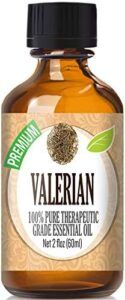
Healing Solutions Valerian Essential Oil – 100% Pure Therapeutic Grade Valerian Oil – 60ml
Dose recommendations
The recommended dosage of valerian root for anxiety varies depending on the form of the herb and the individual’s needs. However, a typical dosage is 300 to 900 milligrams of valerian root extract per day.
Safety precautions
Valerian root is generally safe for most people, but it can interact with certain medications and cause drowsiness. It is important to talk to your doctor before taking valerian root if you are taking any medications or have any health conditions.
Additional tips for using Valerian root
- Start with a low dose and gradually increase it as needed.
- Take valerian root consistently for at least 2-4 weeks to see the full benefits.
- Monitor your progress and adjust the dosage as needed.
- Be patient. It may take some time to feel the full benefits of valerian root.
Valerian root is a natural and effective way to reduce anxiety and improve overall well-being. It is important to talk to your doctor before taking valerian root to ensure that it is safe for you and to discuss the best dosage for your individual needs.
Interested in exploring anxiety relief options beyond herbal remedies? Be sure to check out our article, ‘9 Everyday Anxiety Relief Products: Help in a Chaotic World.‘ It’s packed with insights on diverse products designed to ease your anxiety in today’s fast-paced world.
Taking Control of Anxiety: A Recap of Natural Remedies for Anxiety and Coping Mechanisms

Anxiety is a common and debilitating condition that can affect anyone. While there are many effective medications available for anxiety, some people prefer to try herbal remedies for anxiety. The five herbal remedies for anxiety discussed in this blog post – chamomile, lavender, ashwagandha, passionflower, and valerian root – have all been shown to be effective in reducing anxiety symptoms.
If you are considering trying herbal remedies for anxiety, it is important to talk to your doctor first. They can help you choose an herb that is safe for you and that will interact with any medications you are taking.
In addition to herbal remedies for anxiety, there are many other things you can do to manage anxiety, such as exercise, yoga, meditation, and relaxation techniques.
With the right treatment, you can overcome anxiety and live a full and productive life.
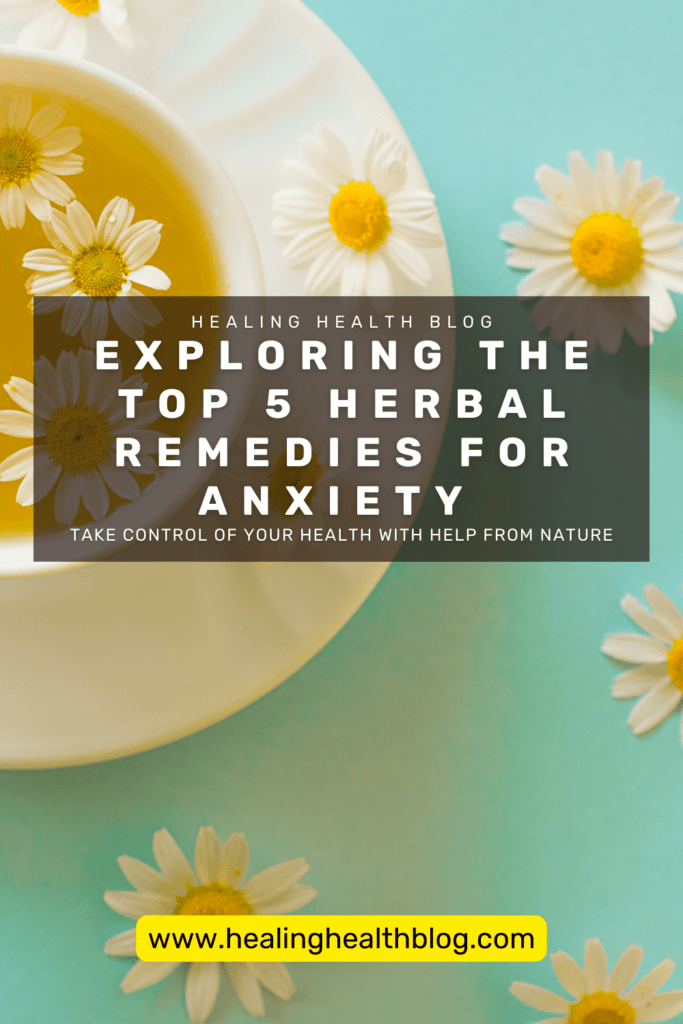
Additional Resources:
- The National Institute of Mental Health: https://www.nimh.nih.gov/health/topics/anxiety-disorders/index.shtml
- The Anxiety and Depression Association of America: https://www.adaa.org/
- The American Psychological Association: https://www.apa.org/topics/anxiety/
Disclaimer: The content provided on this website, including all text, images, and other material, is for informational purposes only and is not intended to be a substitute for professional medical advice, diagnosis, or treatment. While we strive to share knowledge and information based on research, traditions, and personal experiences about natural remedies, readers are encouraged to confirm the information with other reliable sources and consult a qualified healthcare professional before making any health decisions or starting any new treatment. The use of any information provided on this site is solely at your own risk.
We do not claim to diagnose, treat, cure, or prevent any disease or health condition with the information provided. Always seek the advice of your physician or another qualified health provider with any questions you may have regarding a medical condition. Never disregard professional medical advice or delay seeking it because of something you have read on this website.
The owners and contributors of this website accept no liability or responsibility for any inaccuracies, errors, or misinterpretations of the content herein or for any loss, harm, or damage that may arise from accessing or using information on this site.

